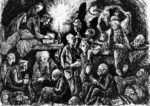Posts Tagged ‘Peggy Rosenthal’
Returning to Form
November 20, 2019
We’re all familiar with how traditional Western art forms were blown to bits in the early to mid-twentieth century. And we know the locus classicus for this in literature: T.S. Eliot’s The Waste Land, written in the wake of the First World War’s perceived destruction of civilization. Recall The Waste Land‘s characteristic phrases:…
Read MoreHow to Celebrate at Death
October 23, 2019
Not every death calls forth celebration. But when the loss is of someone who was granted the gift of a long, good life, it’s that life that we can celebrate. I’m moved to ponder this gift—and how we who remain can celebrate it—because during a single week this past summer, I went to three different…
Read MorePoetry Friday: “Curriculum Vitae”
October 11, 2019
What fun to find a sonnet in Image 102! Yes, a true sonnet—following the meter (iambic pentameter), stanza breaks, and rhyme scheme of a traditional sonnet. Other contemporary poets have explored the sonnet form engagingly: I think of Mark Jarman’s Unholy Sonnets and Jeanne Murray Walker’s new collection Pilgrim: You Find the Path by Walking.…
Read MorePoetry Friday: “Glosa”
September 13, 2019
“Glosa” refers to an invented language created as a way for all the world’s speakers to understand each other.
Read MoreRobert Cording, Simon Weil, and “Attention”
July 25, 2019
Decades ago, when I was being drawn from atheism through agnosticism toward Christianity, somehow Simone Weil’s writings came into my hands. Literally into my hands: so struck was I by her words that I copied pages and pages of them into my journal. Weil became my spiritual director. She led my spirit to eventually embrace…
Read MorePoetry Friday: “Reflection upon Psalm 121”
July 12, 2019
My husband and I pray together after breakfast and after dinner, using The Liturgy of the Hours (a version of the former breviary used by Catholic priests but, after Vatican II, made available to the laity). Each Morning and Evening Prayer includes two psalms. Psalm 121 is read on one Friday evening every four weeks.…
Read MoreArt as Survival: The Terezín Concentration Camp
June 17, 2019
I go to lots of classical music concerts, but I’ve never been so moved as I was by this one. It wasn’t just the profundity of the music; it was also, and especially, the context in which it was composed. The concert was called Music from Terezín Concentration Camp. I’m ashamed to admit that I…
Read MorePoetry Friday: “Articulation”
May 24, 2019
It’s a truism that the writer’s material is words. We rely on our words to do their work: to “mean” something. But in his poem “Articulation,” Scott Cairns questions this reliance. The poem’s speaker says that his only “certainty,” paradoxically, is that his language “falls / ever short.” What he has “come to trust” is…
Read MoreThe Fearless Curiosity of the Ying Quartet
May 8, 2019
Ying Quartet, l-r: David Ying (cello), Janet Ying (violin), new first violinist Robin Scott, and Phillip Ying (viola) outside Kodak Hall at Eastman Theatre, Eastman School of Music March 23, 2015 // photo by J. Adam Fenster / University of Rochester Of all the arts, music is the most difficult to write about. Maybe because…
Read MorePoetry Friday: “Before All Things”
April 26, 2019
Imagine the Gospel narrative taking place right in your home town, right now. How would you know what was going on? How would you react? This is what Tania Runyan imagines with delightful grace in “Before All Things.” In her telling, the key moments in the gospels happen almost simultaneously. First, Christ dies as “a…
Read More



